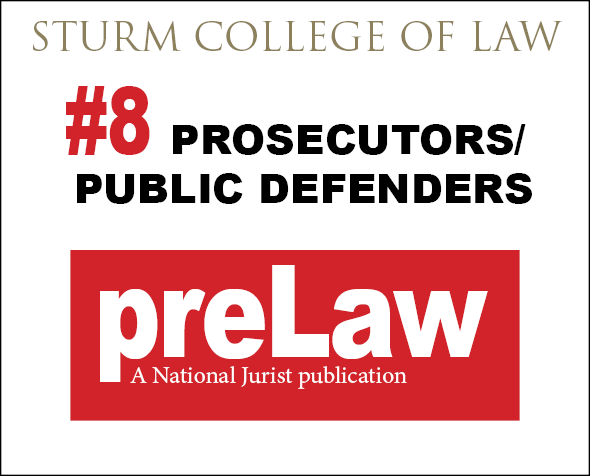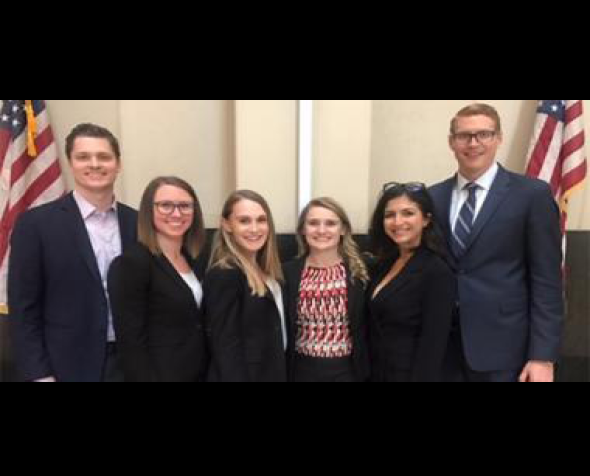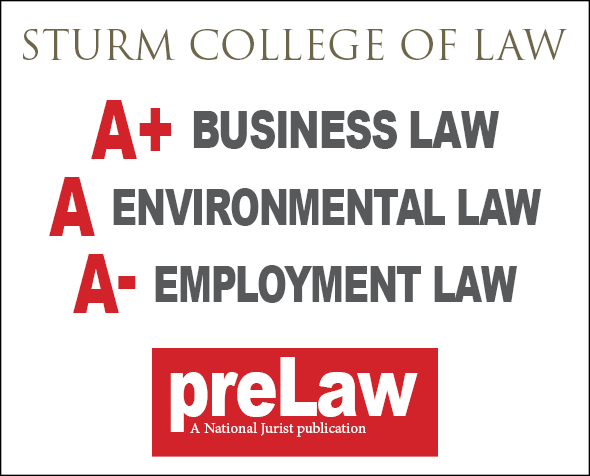Sturm College of Law Veterans Advocacy Project Fights for Veterans’ Benefits and Quality of Life
Clinic has recovered more than $7.2 million for Colorado veterans
When professors, veterans, and law students join efforts, impressive solutions are possible. In the case of the University of Denver Sturm College of Law, that solution is the groundbreaking pro-bono Veterans Advocacy Project (VAP), which is making monumental strides in veteran legal services.
The VAP, the only program of its kind in Colorado, is the brainchild of Denver Law Professor Ann Vessels. She launched the clinic in 2015 after watching her own son, Sean, a former Marine, struggle to come back from three tours in the Middle East. He was struggling with PTSD and had to wait more than a year for his benefits to come through from the Veterans Administration (VA).
“Had he not lived with us, he’d have been on the streets,” said Vessels. Watching her son try to navigate the complex process of getting benefits gave her the incentive to launch the VAP, with the help of Denver Law alumni Mike Shea and Tim Franklin.
The clinic assists veterans who are appealing their VA benefit decisions, as well as those who need help changing their discharge status so they can access any benefits at all. A service member who receives an other-than-honorable discharge is not eligible for most benefits, including health care, disability or the GI Bill.
According to Vessels, other-than-honorable discharges can happen for a number of reasons, including the service members’ behavior, which can also be due to PTSD-related issues, or something as simple as being late a few times. Some discharges can even prevent veterans from gaining employment after they leave the service.
“It just seems unfair in some cases. That’s why we do the work to fight it,” she said.
And fight the clinic does. Since its inception, the clinic has recovered more than $7.2 million for veteran clients through successful discharge upgrade applications and VA disability benefit cases. However, the clinic doesn’t just recover money for veterans, it recovers quality of life.
“There’s a great line from a song that says we send them off to die for us and forget about them when they don’t. That is so, so true. And that’s why we do what we do,” said Vessels.
Vessels has seen veteran clients go from homelessness to receiving full benefits, plus back pay for benefits not received, getting them off the streets.
The clinic’s success is heavily fueled by hands-on, real-world work by Denver Law students who participate. Law students who work in the VAP take a seminar to learn the ins and outs of military benefits and spend 150 hours working with clients over the course of a semester.
Alice Hansen, 2L, works in the VAP and says her time is often spent interviewing clients to understand their situation from their point of view, reviewing any medical or military records, as well as past decisions made about their case, and drafting briefs to appeal past decisions that may have denied the veteran VA benefits or issued an other-than-honorable discharge.
“These can be truly life-changing decisions for a veteran, and it is hard for veterans to find no-cost legal services in these areas, so it is an incredible opportunity to put a legal education into meaningful work,” Hansen said. “I entered into law in order to provide legal services to underserved populations and the Veterans Advocacy Project provided a very hands-on way to learn these skills in serving an incredibly deserving population.”
Veterans Helping Veterans
Several students in the clinic are also veterans themselves, putting them in a unique position to earn real-world legal experience by helping their fellow veterans.
“Doing two combat deployments, it is something I think about every day. I’ve had my own difficulties transitioning back. It’s been tough, but I did have a lot of help. I know a lot of others don’t have that, and I want to do something proactive to help these other men and women,” said Brennan Heuser, 3L, a U.S. Army sergeant who served two deployments, one in Pakistan and one Afghanistan.
For Heuser, while a large part of the program is helping these veterans gain access to benefits, it’s also about giving veterans someone who understands. He said he meets with clients who are really struggling with either mental or physical injuries due to their time in the service but have the military mentality that you don’t ask for help and you just handle it yourself.
“It’s pretty emotional. You’re dealing with really tough stories. I can relate to a lot of these stories, so I just work on having a healthy relationship with my clients. We’re trying to help people, and we are in a good position to help them legally by just listening to their story. It can save a life, honestly,” he said.
Martin Carbajal, 2L, a petty officer in the U.S. Navy, said that it has been rewarding working with veterans and helping them move forward with their lives. Two clients he’s working with are waiting for discharge upgrades.
“These upgrades are huge for them because they will be able to get their educational benefits. One can not only get his educational benefits, but because the discharge characteristics he received, he can’t even get a job. So, to help him to be able to go work is huge,” Carbajal said.
For both veteran students working with the VAP, it’s about honoring their military service and giving back to others.
“We have a lot of pride in what we do, and just knowing that they are going to get some benefit out of it is rewarding,” Carbajal said.
Help the Veterans Advocacy Project
The VAP’s services are in high demand, and Vessels has a goal to continue to raise awareness and funding to serve as many veterans as possible. You can help by donating to the Veterans Clinic Gift Fund.
“Some of these veterans are being held back economically and socially. They are stuck at where they are at in their life then and there. As far as getting things back on track for them and helping out, ultimately, the Veterans Advocacy Project is the best avenue,” related Carbajal.





